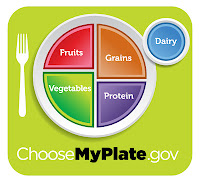Timing is everything in life….especially when it comes to weight loss. A timely study just released from the Journal of the Academy of Nutrition and Dietetics reminds us that the calorie density, or the amount of calories per bite of food that you eat, may make all the difference in helping you painlessly shed some of that extra winter weight.
Just ask Barbara Rolls, PhD, researcher, and author of the just released, The Ultimate Volumetrics Diet, an updated and expanded version of her bestseller book published in 2004. According to research, much of which was conducted by Rolls, it is the volume of food rather than the calories that is the key to helping you feel satisfied or satiated when you eat. Translation: When it comes to weight loss, you need to outsmart your stomach by filling it up with a large volume of low calorie-dense foods to satisfy your hunger, which will enable you to cutback on daily calories. In this case, size does matter.
For example, an apple that would fit in the palm of your hand (about 3 inches) is a mere 75 calories. Because over 85 percent of its weight is from water (0 calories) and fiber (0 calories), it is considered a low-density food as it is low in calories per bite. However, a slice of apple pie, which could also fit in the palm of your hand, has calorie-dense fat and sugar added, along with the apples, so will serve up about 300 calories a slice. (That’s without the a la mode part.) You would have to eat four apples to consume the equivalent of the calories in the pie slice. Because of the apple’s volume, you would likely get “full” after chomping on an apple or two, and thus, consume less calories overall.
Compare these two meals:
 |
| Source: CDC |
Volume-wise, the more colorful dinner plate of grilled chicken, which is loaded with tons of low calorie, high-volume veggies is going to fill you up for less calories compared to the higher fat, more caloric-dense fried chicken meal. In fact, the puny portions in the fried chicken dinner may cause you to go back for seconds (adding more calories to your meal) in order to obtain the volume of foods you need to eat to feel full.
The same strategy goes for soups. By ladling a low-calorie dense, veggie-based soup rather than a high calorie-dense fatty chowder in your bowl, you will end up consuming the same volume of soup but for less calories:
 |
| Source: CDC |
This is actually part of the logic behind the new MyPlate. By devoting half of your plate to low- calorie, high-volume fruits and veggies, you will crowd out the higher, calorie-dense items on your plate while feeling satisfied.
Need help in planning meals that are voluminous but not high in calories? The Ultimate Volumetrics Diet also contains over 100 new recipes developed by registered dietitian and culinary wizard, Mindy Hermann, as well as advice for when you are food shopping and dining out.
You can eat more and weigh less.


